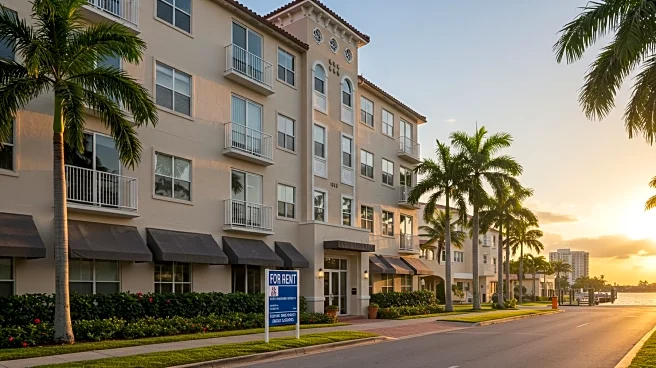What's Happening?
Fort Lauderdale has emerged as Florida's most sought-after city for renters, surpassing Miami according to a recent RentCafe report. The city's Renter Engagement Tracker (REnT) score is over 70, making it the top city in the state and the 20th in the nation. This score is determined by factors such as apartment availability, online page views, and apartments saved by prospective renters. Fort Lauderdale's appeal is attributed to its community-driven neighborhoods, offering a mix of housing options like single-family homes, townhomes, and apartment complexes. In contrast, Miami's rental market has seen a 70% increase in available listings, but only a 3% increase in apartments added to favorites, indicating potential dissatisfaction among renters.
Why It's Important?
The shift in rental market dynamics between Fort Lauderdale and Miami highlights changing preferences among renters in Florida. Fort Lauderdale's community-focused environment and diverse housing options are attracting those seeking a neighborhood feel, away from Miami's busy and traffic-heavy lifestyle. This trend could impact real estate development and investment strategies in both cities, as developers may need to adjust their offerings to meet evolving demands. Additionally, Miami's continued appeal to ultra-wealthy individuals suggests that while its rental market faces challenges, its status as a luxury destination remains strong.
What's Next?
As Fort Lauderdale continues to gain popularity, real estate developers and investors may focus on expanding housing options to accommodate growing demand. Miami, on the other hand, might need to reassess its rental offerings to better align with renter preferences. The ongoing population growth and strong job market in Florida will likely sustain interest in both cities, but the nature of that interest may evolve. Stakeholders in the real estate sector will need to monitor these trends closely to capitalize on opportunities and address potential challenges.
Beyond the Headlines
The rental market shift could have broader implications for urban planning and community development in Florida. Fort Lauderdale's rise may encourage other cities to adopt similar community-focused strategies to attract renters. Additionally, the emphasis on neighborhood-driven living could influence cultural and social dynamics, fostering stronger local communities and potentially impacting public policy related to housing and urban development.











